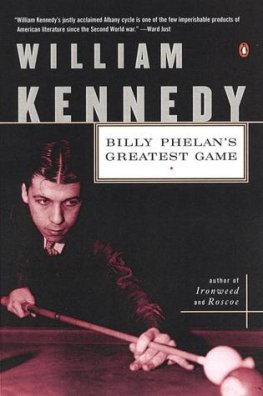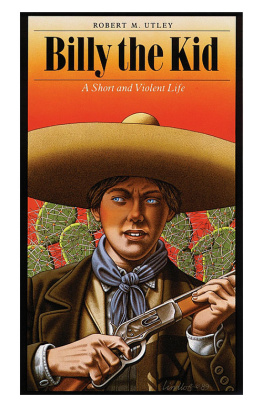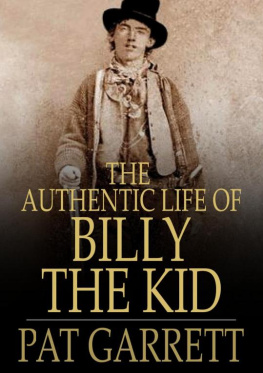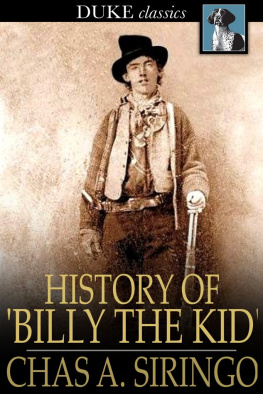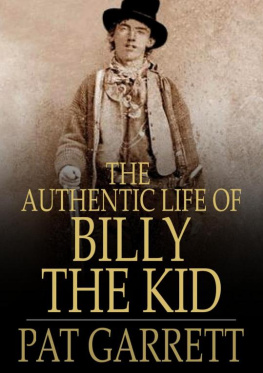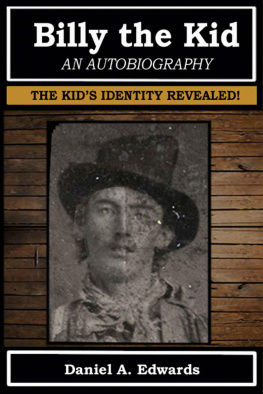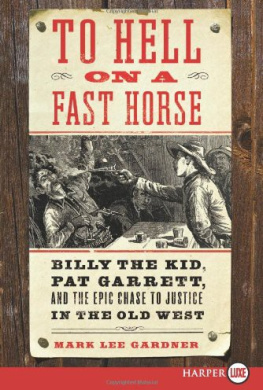New Material 2006 by Sunstone Press. All Rights Reserved.
No part of this book may be reproduced in any form or by any electronic or mechanical means including information storage and retrieval systems without permission in writing from the publisher, except by a reviewer who may quote brief passages in a review.
Sunstone books may be purchased for educational, business, or sales promotional use. For information please write: Special Markets Department, Sunstone Press, P.O. Box 2321, Santa Fe, New Mexico 87504-2321.
Library of Congress Cataloging-in-Publication Data:
Poe, John William, 1850-1923.
The death of Billy the Kid / by John William Poe ; new foreword by Marc Simmons. p. cm. (Southwest heritage series)
Originally published: Boston : Houghton Mifflin, 1933.
ISBN 0-86534-532-5 (softcover: alk. paper)
ISBN 9-78161139-147-3 (e-book)
1. Billy, the KidDeath and burial. 2. OutlawsSouthwest, NewBiography.
3. Poe, John William, 1850-1923. 4. Peace officersSouthwest, NewBiography.
5. Southwest, NewHistorv1848- 6. Frontier and pioneer lifeSouthwest, New.
I. Title. II. Series.
F786.B54P64 2006
364.1552092-dc22
[B]
2006017896
WWW.SUNSTONEPRESS.COM
SUNSTONE PRESS / POST OFFICE BOX 2321 / SANTA FE, NM 87504-2321 /USA (505) 988-4418 / ORDERS ONLY (800) 243-5644 / FAX (505) 988-1025
T he Southwest Heritage Series is dedicated to Jody Ellis and Marcia Muth Miller, the founders of Sunstone Press, whose original purpose and vision continues to inspire and motivate our publications.
I
THE SOUTHWEST HERITAGE SERIES
T he history of the United States is written in hundreds of regional histories and literary works. Those letters, essays, memoirs, biographies and even collections of fiction are often first-hand accounts by people who wanted to memorialize an event, a person or simply record for posterity the concerns and issues of the times. Many of these accounts have been lost, destroyed or overlooked. Some are in private or public collections but deemed to be in too fragile condition to permit handling by contemporary readers and researchers.
However, now with the application of twenty-first century technology, nineteenth and twentieth century material can be reprinted and made accessible to the general public. These early writings are the DNA of our history and culture and are essential to understanding the present in terms of the past.
The Southwest Heritage Series is a form of literary preservation. Heritage by definition implies legacy and these early works are our legacy from those who have gone before us. To properly present and preserve that legacy, no changes in style or contents have been made. The material reprinted stands on its own as it first appeared. The point of view is that of the author and the era in which he or she lived. We would not expect photographs of people from the past to be re-imaged with modern clothes, hair styles and backgrounds. We should not, therefore, expect their ideas and personal philosophies to reflect our modern concepts.
Remember, reading their words and sharing their thoughts is a passport back into understanding how the past was shaped and how it influenced todays world.
Our hope is that new access to these older books will provide readers with a challenging and exciting experience.
II
FOREWORD TO THIS EDITION
by
Marc Simmons
I f thirty -year-old John William Poe had not been present on the evening of July 14, 1881 when his boss Sheriff Pat Garrett killed Billy the Kid at Fort Sumner, New Mexico, then Poe would have missed his main chance to be remembered by history. As it was, he earned a niche in the annals of the Old West by participating in one of the most publicized incidents on the Southwestern frontier.
Raised on the family tobacco farm in Kentucky, John Poe struck out on his own in 1870, nearing the age of twenty, and headed west to find his destiny A string of hard labor jobs, including that of a buffalo hunter on the plains of west Texas, seasoned the lad and provided experience useful for his next calling, in law enforcement.
Poe first served as a deputy U.S. marshal in Shackelford County, Texas and then in 1879 he became deputy sheriff of Wheeler County in the Panhandle. At the end of the following year, The Canadian River Cattlemens Association hired Poe to serve as their representative and join New Mexico lawmen in tracking down Billy the Kid, whose livestock rustling had long proved costly to Texas ranchers. John Poes own account of what followed, incorporating the sensational slaying of Billy the Kid, forms the subject of this book.
John Poe during that episode received an appointment as a special deputy sheriff of Lincoln County, New Mexico even while he remained in service to the Cattlemens Association. Gaining a reputation for honesty and fair play, he was able to win election as sheriff upon retirement of Pat Garrett in 1882. A year later he married Sophie Alberding, a native of California who had been living with the pioneer Lea family in Roswell on the Pecos River.
Thereafter, John William, as his wife Sophie always called him, finished up his career as a law officer, ranched for a time near Fort Stanton, and spent the last decades of his life as a Roswell business man, banker, and a regent of the prestigious New Mexico Military Institute. A photographic portrait of him in those years shows a distinguished gentleman, fashionably dressed and properly groomeda far cry from his rough early-day appearance as a buffalo hunter. John W. Poe died at Roswell in 1923, a man who had lived in two worlds.
Understandably, Mr. Poe late in life was sought out by scholars, popular writers, and others seeking knowledge concerning the killing of the Kid. He finally committed to paper his recollections on that subject and turned the short manuscript over to his wife for safe-keeping.
The Death of Billy the Kid first appeared in print in magazine format (1919). Noted western author E. A. Brininstool privately printed the text as a brochure in 1922 and again in 1923. Houghton Mifflin Company of Boston brought out the first edition in book form with hard covers and illustrations in 1933. It contains a lengthy and still valuable introduction by Colonel Maurice Garland Fulton (18771955), an English professor at the New Mexico Military Institute. The cadets affectionately called him Pappy.
Based on his reputation as a scholar of the Lincoln County War, Sophie Poe had urged that Colonel Fulton be enlisted to write the introduction for The Death of Billy the Kid. Although an abundance of new material has surfaced since he composed the introductory essay, his summary of events, therein, that led up to Billys death provides modern readers with enough background to place Poes narrative in proper perspective.
The Death of Billy the Kid has been out of print for decades. Interest in the young outlaws career continues unabated, so that this new 1933 facsimile reprint of John W. Poes book should find an eager readership.


